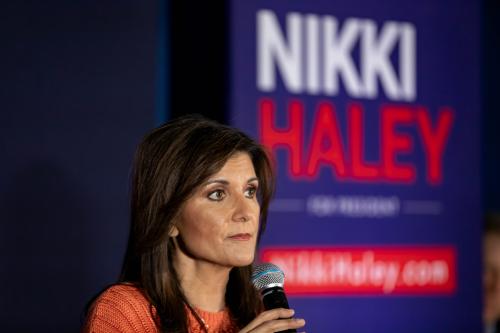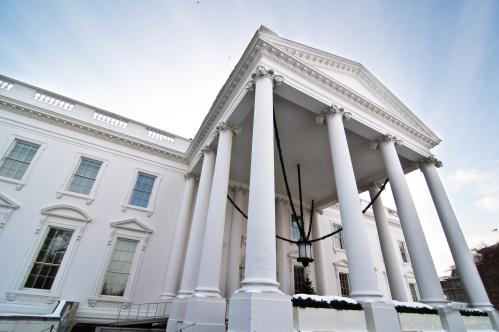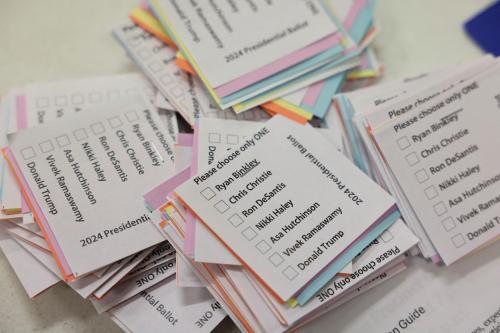It is popular to bash the federal government on grounds it is bloated, ineffective, and wasteful. As Ronald Reagan argued in his 1981 inaugural address, “Government is not the solution to our problem, government is the problem.” Public opinion polls document that many people largely agree with this critique. For example, Gallup surveys show that the number of people that believe the government has too much power has risen from 39% to 60% in recent years. Substantial majorities think the government is not very effective at solving problems.
Yet that reasoning ignores the numerous government success stories of the last few decades. In this article, I list ten areas where government action has made a positive impact on the United States, created social and economic opportunities, and improved people’s lives. These programs have remained popular with the public and attempts to dismantle them would almost certainly be met with forceful objections. Those who believe in government action need to explain to voters why the public sector works and provide examples of major success stories. Continuing to ignore evidence of government effectiveness limits the debate and allows government critics to unfairly dominate the conversation and keep needed reforms off the policy agenda.
1) Women’s sports
When I was growing up in the 1960s, female sports largely sat at the backwaters of American society. There was little public support for or encouragement of female athletes, and most schools advantaged male over female sports teams. But all that changed in 1972 when Congress passed Title IX Education Amendments that paved the way for dramatic improvements. The legislation outlawed gender-based discrimination in federally-funded organizations, required regular reporting of staffing and financial support for men’s and women’s sports teams, and improved enforcement mechanisms.
Since then, the gains for female athletes have been extraordinary and illustrate a dramatic government success story. When a marginalized part of the population gains greater opportunities as a result of congressional legislation, the results can be spectacular. Women perform at a high level and set performance records. The improvements show how government action can create opportunities and allow large parts of the population to realize their athletic potential.
2) Anti-smoking campaigns
There has been a dramatic reduction in U.S. smoking rates since health studies funded by government identified smoking risks, legislatures passed higher taxes and anti-smoking laws, and agencies financed major public service announcements warning about the dangers of smoking. In 1965, 42% of Americans smoked, but that number dropped to 11% in 2022, a stunning 74% reduction in smoking rates. The government-required disclosure of health risks on tobacco products alerted smokers to the dangers of heart attacks, lung disease, strokes, and other maladies and helped persuade millions of people to stop smoking. Higher taxes on tobacco products and passage of legislation banning smoking on flights, in restaurants, and at places of work further made a difference and illustrate how a combination of laws, taxes, regulations, and accurate information can have a positive impact on people’s personal behavior. This combination of several different types of government actions led Popular Science to publish an article proclaiming “the US is winning the war against cigarettes.”
3) Air pollution reduction
There has been a dramatic drop in air pollution since passage of the 1972 Clean Air Act. A number of American places experienced serious pollution problems prior to this time. In 1970, for example, there were 23 million tons of sulfur dioxide released into the U.S. atmosphere, but this declined to 1.8 million tons by 2022, a drop of 92%. There was a similar 82% drop in release of nitrogen oxide as it went from 40 million in 1970 to 7.4 million tons in 2022. These extraordinary drops over the last 50 years came about as a result of congressional legislation, tough enforcement action, and penalties imposed on companies that violated state and national emission standards. The shift shows how clear and consistent government action can pay significant environmental dividends.
4) Handicap accessibility
Passage of the 1990 Americans with Disabilities Act has improved access for the visually and hearing impaired and those with mobility limits. Around one-third of U.S. homes now are accessible. Door frames have widened in order to accommodate those in wheelchairs. Bathrooms have been made more accessible. There is software that reads online text for people who have visual impairments. Requirements promoting accessibility in housing, transportation, education, and health care help those with physical limitations reach their potential.
5) Childhood poverty reduction
When Congress expanded child tax credits as part of the 2021 American Rescue Plan from $2,000/child to $3,600/child for those under six years old and $3,000/child for those ages six to 17, it cut childhood poverty in half. According to analysis from the Tax Policy Center, only 5.2% of children were living in poverty that year due to the government benefit. But that percentage immediately jumped to 12.4% in 2022 when the credit lapsed. The shift demonstrates the power of public policy to alleviate childhood poverty when there is a concerted effort to do so.
6) Health insurance coverage
Passage of the Affordable Care Act (or Obamacare) reduced the health uninsured rate substantially in America. In 2010, according to the Kaiser Family Foundation, the number of Americans without health insurance was 46.5 million (or 17.8% of the population). But after ACA implementation in 2016, the number of uninsured dropped to 26.7 million (or 10%). That single piece of legislation cut the uninsured rate by 44% and provided 20 million Americans who previously did not have health insurance with needed coverage.
7) Scientific advancement
The United States excels in science and technology due to government investments in infrastructure, higher education, research and development, and space exploration. Government was instrumental in turning ARPANET into what now is known as the internet. Higher education flourished following World War II due to public investments, the GI bill, and money for constructing dorms, classrooms, and scientific labs. Space exploration has been a particular plus, with the U.S. being the first nation to put humans on the moon, land rovers on Mars, and launch telescopes into outer space. There have been over 2,000 commercial spinoffs from government investments in space programs.
8) Franchise extension
During the early years of American democracy, a relatively small number of Americans was allowed to vote. Indeed, some estimates claim that only 20-25% of adults then had the right to vote. At that time, women and slaves were not allowed to vote and a number of places had property requirements that precluded many white men from casting ballots. But since then, property requirements have been dropped and the franchise extended to women in 1920, African Americans through the Voting Rights Bill of 1965, and those aged 18 to 20 in 1970. With the exception of convicted felons who often do not have the right to vote, nearly every American adult now over the age of 18 can cast ballots for elective office as long as they register to vote. This expansion of voting rights over two centuries gives nearly all adults in the United States the right to express their political preferences if they choose to do so.
9) GI Bill
One of the most successful federal programs of all time has been the 1944 Servicemen’s Readjustment Act (or GI bill). Enacted during World War II, it provided government assistance for soldiers, veterans, and their dependents to attend school, buy homes, and get business loans. Between 1944 and 1956, it helped 10 million people gain assistance and attend college. Around 4.3 million veterans were able to buy homes during this period. Since then, the Department of Defense estimates that another 10 million has been aided by government assistance, bringing the overall total to over 20 million individuals helped. The original legislation plus its successor bills have provided valuable assistance up through the current period to society, the economy, and higher education.
10) E-government satisfaction
Citizen assessments of e-government services generally are positive and not characterized by partisan divisions. People like the convenience and 24/7 accessibility of online services. They don’t have to go physically to a government building and can complete transactions and service requests from the convenience of their homes. Surveys undertaken by the American Customer Satisfaction Index have found that “citizens are happier with their federal government interactions than at any time since 2018.” Americans hold positive views about government websites and there are few differences in assessments between Republicans, Democrats, and Independents. Unlike public attitudes toward government in general, which tend to be negative, people like digital government and appreciate its convenience and accessibility.
The Brookings Institution is committed to quality, independence, and impact.
We are supported by a diverse array of funders. In line with our values and policies, each Brookings publication represents the sole views of its author(s).








Commentary
10 success stories of government action in the United States
January 31, 2024